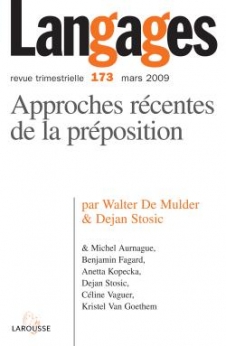
Langages n° 173 (1/2009)
Pour acheter ce numéro, contactez-nous
Recevez les numéros de l'année en cours et accédez à l'intégralité des articles en ligne.
The knowledge we have concerning the French word hors is limited to the work of lexicographers, who attempt to list all the meanings it can have. The diachronic study of hors presents its grammaticalization chain and the semantic evolution of its uses. Our synchronic study shows that hors can certainly be identified as a preposition ( hors les murs - outside the walls), but it can also be identified as a word 'formant' (un hors-d’oeuvre), a locution (Il est hors jeu- He is offside ), an adverb (Une fois hors, il sera repris par la brigade - Once outside, he will be recaptured by the squad) or a complex preposition (On se jeta hors des lits - We burst out of the beds). Progress is made in the definition of the semantic identity of this expression thanks to a formal (distributional and syntactic) analysis. Thus, hors has a temporal meaning that indicates an end state ; it reveals a resulting state which succeeds to a presupposed initial state.

